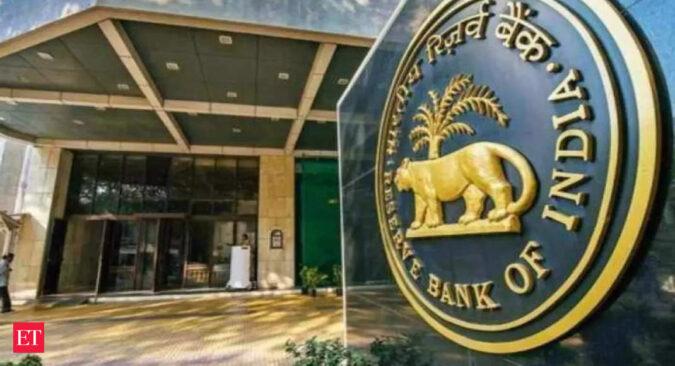However, beyond the policy rate and macro outlook tweaks, the central bank today also proposed a range of measures including QR code-based coin vending machine, extending UPI for inbound travellers to India & regulatory initiatives on climate risk.
Here’s what the key announcements are:
QR code-based coin vending machines in 12 cities soon
The RBI is preparing a pilot project on QR Code based coin vending machine in collaboration with a few leading banks to enhance ease of access of coins, distribution of coins using machines.
These vending machines are intended to be installed at public places such as railway stations, shopping malls, marketplaces to enhance ease and accessibility.
The QCVM is a cashless coin dispensation machine which would dispense coins against a debit to the customer’s bank account using Unified Payments Interface (UPI).Unlike cash-based traditional Coin Vending Machine, the QCVM would eliminate the need for physical tendering of banknotes and their authentication. Customers will also have the option to withdraw coins in required quantity and denominations in QCVMs.
The pilot project is planned to be initially rolled out at 19 locations in 12 cities across the country. Based on the learnings from the pilot tests, guidelines would be issued to banks to promote better distribution of coins using QCVMs.
UPI for inbound travellers to India
Travellers coming to India will soon be able to use Unified Payments Interface (UPI) for retail payments in the country.
“UPI has become hugely popular for retail digital payments in India. It is now proposed to permit all inbound travellers to India to use UPI for their merchant payments (P2M) while they are in the country,” Das said.
To start with, this facility will be extended to travellers from the G-20 countries, arriving at select international airports. Going forward, this facility will be enabled across all other entry points in the country. Necessary operational instructions will be issued shortly.
Regulatory initiatives on climate risk and sustainable finance
RBI today announced regulatory initiatives on climate risk and sustainable finance while announcing key policy decisions by Monetary Policy Committee (MPC).
The decision has been made to prepare a strategy based on global best practices on mitigating the adverse impacts of climate change, said Das.
He stated that a discussion paper (DP) on climate risk and sustainable finance was placed on RBI website on July 27, 2022, for public comments and feedback. Based on analysis of the feedback received in this regard, the RBI has decided to issue several guidelines for Regulated Entities (REs).
These guidelines include:
- Broad framework for acceptance of Green Deposits
- Disclosure framework on Climate-related Financial Risks
- Guidance on Climate Scenario Analysis and Stress Testing
The guidelines will be issued in a phased manner, said governor Das in his virtual address.
RBI to allow lending and borrowing in G-Secs, increases trading hours
The Reserve Bank of India today proposed to allow lending and borrowing against government securities to increase the depth of the bond market while also restoring the market trading hours in G-Sec to pre-pandemic levels. Trading hours in G-Sec will be increased 9 am to 5 pm, from current timings of 9 am to 3:30 pm.
“This will provide investors with an avenue to deploy their idle securities, enhance portfolio returns and facilitate wider participation. This measure will also add depth and liquidity to the G-sec market; aid efficient price discovery; and work towards a smooth completion of the market borrowing programme of the centre and states,” Das said in his policy address.
GDP growth outlook for FY24 pegged at 6.4%
Reserve Bank of India (RBI) Governor Shaktikanta Das on Wednesday said at the Monetary Policy Committee (MPC) in its February meeting has pegged real GDP growth for FY24 at 6.4%. The first advance estimate pegged FY23 GDP growth at 7%.
The MPC has forecast Q1FY24 growth at 7.8%, Q2 at 6.2%, Q3 at 6% and Q4 at 5.8%.
RBI cuts inflation projection for FY23 to 6.5% from 6.7%, core inflation remains a concern
India’s central bank today cut its inflation forecast for the country for this fiscal year as the worst of price pressures is seen to be behind, but the governor flagged stickiness of the core inflation to be a matter of concern.
The Reserve Bank of India cut inflation aim to 6.5% from 6.7% forecast in December policy. The central bank today also raised the benchmark rate by 25 basis points and retained monetary policy stance of withdrawal of accommodation.
“Inflation has shown signs of moderation and the worst is behind us. But there are concerns around core inflation. We can not take our eyes off inflation,” RBI Governor and MPC Chair Shaktikanta Das said during post-policy press conference.
Inflation in the next fiscal year is expected to be 5.3% for 2023-2024, with Q1 at 5%, Q2 at 5.4%, Q3 at 5.4% and Q4 at 5.6%. The Mint street and its boss had earlier said they expect inflation to ease to 5% by April to June of next year.
